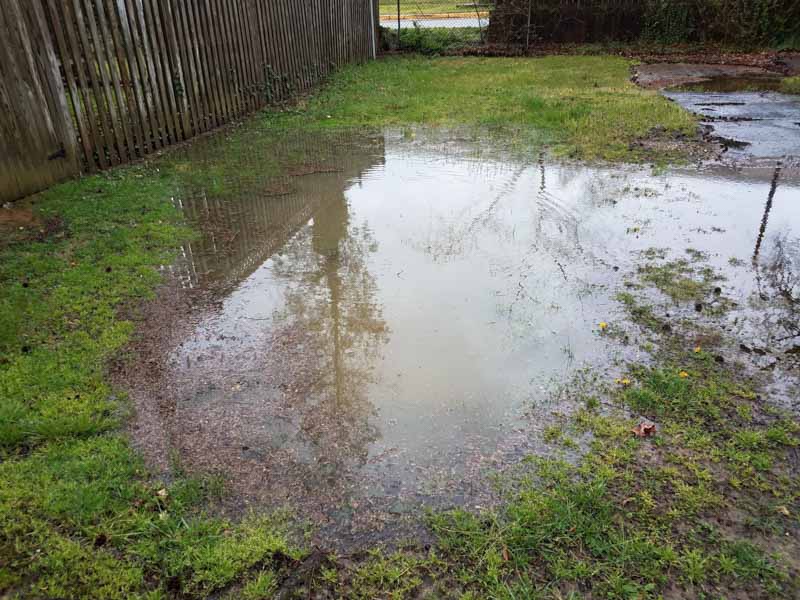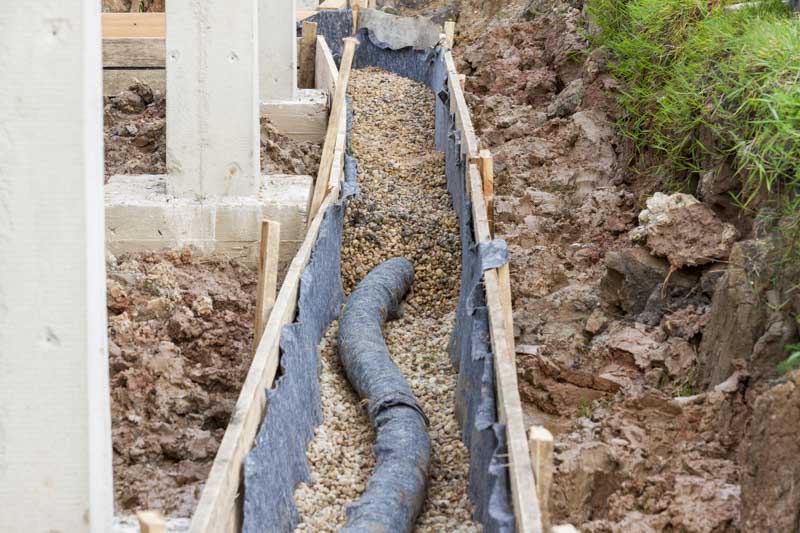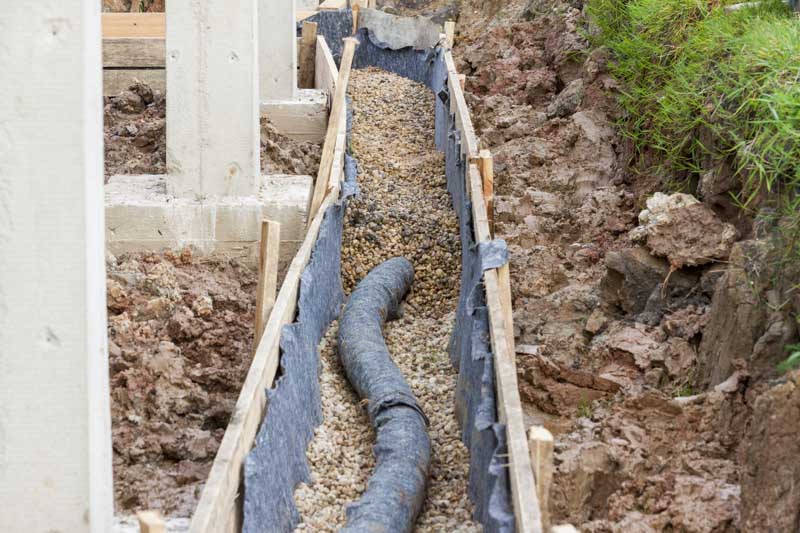
Every home owner should be aware of the problems flooding and water buildup can bring. It can weaken home foundations over time, ruin landscaping, and lead to infestations of insects or mold that endanger human health. If underlying soil is too saturated it, can cause foundation movements that do extensive damage to your home’s structure.
To avoid expensive foundation repair bills, it’s wise to keep an eye on the grading around your home. If you’re seeing excessive water saturation or pockets of standing water after every significant rainfall, you should consider putting some form of drainage system in place.
If the flooding is a result of rain gutters emptying too close to the foundation, solid PVC pipes could be installed to direct rainwater from the roof and away from the house and foundation. If, however, water is ponding due to the improper grading or contours of the surrounding yard and landscaping, there are two options. Either regrade the entire landscape and yard or install a French drain or other drainage system. In some cases, installing a French drain is the best and least expensive option.
What are French Drains?

French drains for foundation protection have been around since the late 19th century. Think of a French drain as essentially an underground gutter system. A French drain uses a system of pipes laid into trenches to collect any build-up of water and channel it away from the home. The pipes are perforated with holes and wrapped with a water-permeable paper that filters out debris but permits efficient collection of ground water. The pipes are typically covered with gravel that allows for better drainage than soil. Often, as in the case with flooding basements, these pipes can be laid within the home or around the foundation itself.
Who Should Have French Drains?
A French drain may be the best choice if:
- The property includes retaining walls or other structures that don’t allow for surface drainage.
- Your basement tends to flood during rainy periods.
- Re-grading the landscape is not feasible.
- The soil around your house can become very soggy and produce standing pools of \water.
- You or a professional foundation inspector notice foundation cracks caused by water buildup.
Due to the expansive clay soil in the Dallas Fort Worth Area, all of these issues can also lead to serious foundation problems.
Drainage Solution For Foundation Preservation
If you have any of the water drainage issues mentioned above, a foundation perimeter drain may be helpful to ensure all excess rainwater is removed to avoid costly foundation problems. French drains are an excellent solution to foundation drainage issues for several reasons:
- If properly installed, they can operate smoothly for years to come.
- A quality drainage system can increase the value of your home.
- They require no special equipment or moving parts, so they don’t break down or involve high maintenance costs.
- Smaller, simpler systems are fairly easy and inexpensive to install, and might be done by an experienced DIY homeowner.
French Drain pipes are laid at an angle to provide rapid drainage toward the desired low point. The goal is to keep as much water as possible away from your home and foundation. In some of today’s houses the drainage system is attached to a sump pump to ensure water flow can keep up with heavy rains.
Some Concerns with French Drains
In some cases it might be enough to lay a French drain near foundation points that collect the most water.
However, installing French drains can also be a complex job. You may have to worry about other sewer or plumbing lines, underground power cables, or the property of your neighbors. You should also take into account growing root systems, such as from surrounding hedges or shrubbery that might damage your drain system in the future.
If you have multiple structures, you may have to plan in each case for a French drain along the foundation to ensure adequate drainage over wider areas. There is also a need to include cleaning ports at points in the system so that pipes can be inspected and cleared in case an obstruction does occur.
If you’re planning on a French drain installation, you might want to talk to your insurer. They may allow you to add the new drain system to your homeowner’s policy so that you’re covered if repairs to the system are needed.
French Drain to prevent Foundation Problems in Dallas Fort Worth
The Dallas Fort Worth area is notorious for its foundation problems. As mentioned, the main issue is the expansive clay soil in the area and how it reacts to water. When water builds up around your home during rainy periods, this expansive clay soil, as the name implies, expands, and it expands at a rate far greater than soil in other areas. This is why there are so many foundation problems in the area. What makes the situation even worse is the fact that the area weather is not consistent. There are long stretches of dry weather followed by rainier months. This exacerbates the problem as the oscillation between dry and wet causes large changes in the soils volume, putting greater stress on your foundation.
If you notice foundation cracks or other water related issues, it may be a good idea to install a French drain or other drainage solution. If you have cracks or other visible damage to your foundation, before getting a costly repair, have an independent foundation inspector come inspect the foundation. In many instances, all that is needed is a drainage solution. Give us a call or schedule an inspection online to get an unbiased assessment and recommendations for your foundation issues. We look forward to hearing from you.


Recent Comments